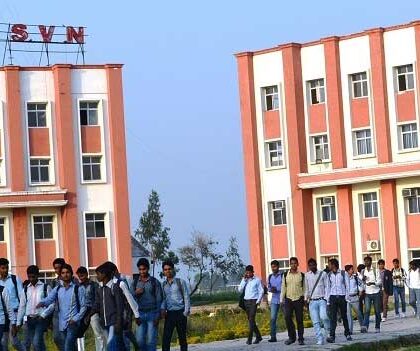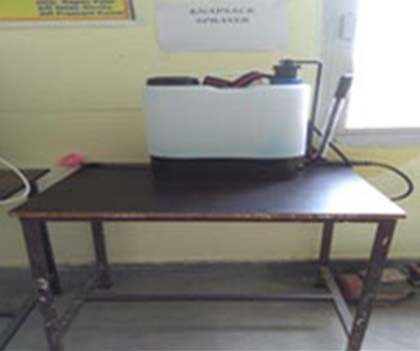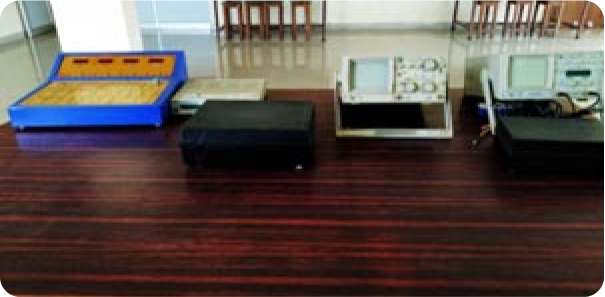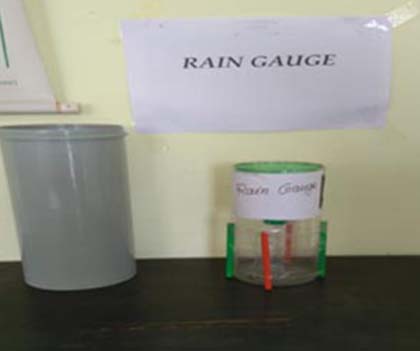Agricultural Engineering
Agricultural Engineering is the area of engineering concerned with the design, construction and improvement of farming equipment and machinery. Agricultural engineers integrate technology with farming. For example, they design new and improved farming equipment that may work more efficiently, or perform new tasks.
Agricultural engineers typically work in offices, but may spend time at a variety of worksites, both indoors and outdoors. They may travel to agricultural settings to see that equipment and machinery are functioning according to both the manufacturers’ specifications and federal and state regulations. Some agricultural engineers occasionally work in laboratories to test the quality of processing equipment. They may work onsite when they supervise livestock facility upgrades or water resource management projects.
Agricultural engineers work with others in designing solutions to problems or applying technological advances. They work with people from a variety of backgrounds, such as business, agronomy, animal sciences, and public policy.
The vision of the department is to establish itself as a Centre of Excellence in terms of research and teaching in its chosen Areas. Our undergraduate program is based on the pedagogy of learning by doing. The Aim is to invoke in our students a sense of inquisitiveness to question and to motivate them to think about the theoretical and applied problems in technology for the benefit of society. Each faculty is given adequate time to the students and are encouraged to take up project work in the area of Post Harvest, Irrigation, and Soil water Conservation & Farm Machinery.
The Department has Qualified and Experienced Faculty Members, all holding degrees from Renowned Institutes. Over the years the Department has developed excellent facilities to impart training in the areas of Farm Machinery & Tractors, Irrigation & Drainage Engg., Soil & Water conservation and Agro processing and also the department has organised many faculty development programmes to enhance the knowledge of faculties. We also Undertake research projects sponsored by the industry.


Our Vision
Be a pioneer educational campus aiming for the holistic development of students, producing professionals, entrepreneurs with high ethical and moral values and ready to conquer the future challenges.

Our Mission
◉ To provide effective teaching, learning
and adapting environment.
◉ To achieve quality education with employability.
◉ To develop high ethical and moral values among students.
◉ To inculcate creative, versatile outlook among students and support entrepreneurial endeavours for them.

Our Values
The will to win, the desire to succeed, the urge to reach your full potential… these are the keys that will unlock the door to personal excellence
Our Vision
To establish the department of Agricultural Engineering as a landmark to accomplish the comprehensive improvement of students and prepare them for global agricultural needs.
Our Mission
◉ To provide extensive knowledge along with its applications in the field of Irrigation, Drainage, Post-harvest, and Farm Machinery through an effective teaching-learning process.
◉ To innovate in the field of Agricultural Technologies for the enhancement of all stake holders.
◉ To produce skilled prospective engineers for the demand of global needs.
◉ To aware the farmers about cost-effective cultivation techniques for better Agricultural productivity to push up their standards.
Program Educational Objectives (PEOs)
PEO-1: Prepared the Agricultural engineering graduates ready for plans of industry and advanced education.
PEO-2: Instill thorough information in the field of Agriculture from the soil up to the customer.
PEO-3: Fortify the integrative knowledge to help allied fields in agriculture engineering graduates.
PEO-4: Ethically sound professionals with adaptability to gain command of trending knowledge for their development.
PEO-5: To firm the mental abilities of agriculture graduates with social cognizance for vanquishing real-world complications.
Program Educational Objectives (PEOs)
(Engineering Graduates will be able to)
PO-1 Engineering Knowledge: Apply the knowledge of mathematics, science, engineering fundamentals, and an engineering specialization to the solution of complex engineering problems.
PO-2 Problem analysis: Identify, formulate, review research literature, and analyze complex engineering problems reaching substantiated conclusions using first principles of mathematics, natural sciences, and engineering sciences.
PO-3 Design/development of solutions: Design solutions for complex engineering problems and design system components or processes that meet the specified needs with appropriate consideration for the public health and safety, and the cultural, societal, and environmental considerations.
PO-4 Conduct investigations of complex problems: Use research-based knowledge and research methods including design of experiments, analysis and interpretation of data and synthesis of the information to provide valid conclusions.
PO-5 Modern tool usage: Create, select, and apply appropriate techniques, resources, and modern engineering and IT tools including prediction and modeling to complex engineering activities with an understanding of the limitations.
PO-6 The engineer and society: Apply reasoning informed by the contextual knowledge to assess societal, health, safety, legal and cultural issues and the consequent responsibilities relevant to the professional engineering practice.
PO-7 Environment and sustainability: Understand the impact of the professional engineering solutions in societal and environmental contexts, and demonstrate the knowledge of, and need for sustainable development.
PO-8 Ethics: Apply ethical principles and commit to professional ethics and responsibilities and norms of the engineering practice.
PO-9 Individual and team work: Function effectively as an individual, and as a member or leader in diverse teams, and in multidisciplinary settings.
PO-10 Communication: Communicate effectively on complex engineering activities with the engineering community and with society at large, such as, being able to comprehend and write effective reports and design documentation, make effective presentations, and give and receive clear instructions.
PO-11 Project management and finance: Demonstrate knowledge and understanding of the engineering and management principles and apply these to one’s own work, as a member and leader in a team, to manage projects and in multidisciplinary environments.
PO-12. Life-long learning: Recognize the need for and have the preparation and ability to engage in independent and life-long learning in the broadest context of technological change.
Program-Specific Outcomes (PSOs)
After the successful completion of the B.Tech program in “Agricultural engineering” the graduate will have
PSO-1: To impart practical knowledge to students to grasp, examine, and develop innovative products as well as provide solutions for the real-life problems of agriculture.
PSO-2: To impart the ability to students to make quality projects work by using multi-disciplinary areas of agricultural engineering such as crop production and soil management including agronomy, horticulture, soil science, plant protection, genetics, plant breeding, and scientific methods.
PSO-3: To impart knowledge to students to use modern techniques, and advanced Agro meteorological methods, to solve industrial and societal problems.
Opportunities For Agricultural Engineers
Agricultural engineers work in farming, including aquaculture (farming of seafood), forestry, and food processing. They work on a wide variety of projects. For example, some agricultural engineers work to develop climate control systems that increase the comfort and productivity of livestock whereas others work to increase the storage capacity and efficiency of refrigeration. Many agricultural engineers attempt to develop better solutions for animal waste disposal. Those with computer programming skills work to integrate artificial intelligence and geospatial systems into agriculture. For example, they work to improve efficiency in fertilizer application or to automate harvesting systems.
Agricultural engineers typically do the following
- Use computer software to design equipment, systems, or structures
- Modify environmental factors that affect animal or crop production, such as airflow in a barn or runoff patterns on a field
- Test equipment to ensure its safety and reliability
- Oversee construction and production operations
- Plan and work together with clients, contractors, consultants, and other engineers to ensure effective and desirable outcomes
Industries in which electrical engineers can make career
- Use computer software to design equipment, systems, or structures
- Modify environmental factors that affect animal or crop production, such as airflow in a barn or runoff patterns on a field
- Test equipment to ensure its safety and reliability
- Oversee construction and production operations
- Plan and work together with clients, contractors, consultants, and other engineers to ensure effective and desirable outcomes
Industries in which electrical engineers can make career
- Departments of Agricultural Engineering
- Water management
- Area development projects
- Agricultural machinery manufacturing organizations
- Tea gardens
- Minor irrigation projects
- Food Corporation of India
- National Seeds Corporations
- Dairy, food, agro industries
- National Dairy Development Board
- NABARD and other banks
- Agricultural finance corporations
- Indian Council of Agricultural Research
- Council of Scientific and Industrial Research
- Agricultural Universities
- Non-government voluntary organizations
- Consultancies
- Processing agricultural product
Agricultural Engineering Labs
Farm Machinery and Power Engineering
Farm Machinery Laboratory
In this lab, students learn about various equipments for seed bed preparation, Planters,
Combine, Threshers, Weeder, Sprayers and Dusters etc.


Tractor Power Laboratory
In this lab, students learn about cut models of two stroke and four stroke engine, Fuel system, Cooling system, Differential, Power steering and Power transmission etc.

Irrigation and Drainage Engineering Laboratory
In this lab, students learn about soil core sampler, Measurement of discharge in open channel through V-notch, Weirs, Parshall flume, Study of pumps like centrifugal pump, Reciprocating pump, Submersible pump, Study of MIS (Micro Irrigation System) sprinklers and drip irrigation system, Hydraulic ram, Moisture meter and TDS meter etc.


Soil and Water Conservation Engineering and Watershed Hydrology Laboratory
In this lab, students learn about measurement of rain depth by rain gauge, Measurement of wind velocity Anemometer, Soil moisture meter, Pan Evaparimeter, Soil consolidation and compaction test, Dam models etc.

Post Harvest Process and Food Engineering Laboratory
In this lab, students learn about vacuum oven, Water bath, BOD (Biochemical oxygen demand) Incubator, Fluid bed dryer, Lab water purification system, Tray dryer, Solar dryer, Hot air oven, Freeze dryer, Rice milling etc.

Fluid Mechanics Laboratory
In this lab, students learn about equipped with closed circuit Pelton wheel and Francis turbines, Hydraulic ram, Different pumps and Flow measuring equipment.
Thermodynamics and Refrigeration and Air Conditioning Laboratory
In these labs, students learn about major equipment multi-cylinder engine test rig with facility to conduct the Morse test, working models of engine components, Exhaust Gas Analyzers for both SI and CI engines. In Air Conditioning system with facilities of both, winter and summer air conditioning, Vapour compression systems and Vapour absorption system.
Surveying Laboratory
In this lab, students study about Chain survey, Conventional instruments like dumpy level, auto level, Theodolite, Plane table, Prismatic compass and GPS system etc.
Computer Laboratory
In this lab, students learn about equipped with 40+ Computers, AUTO CAD, C and C++ programming, DBMS, etc.
Agricultural Faculties

Prashant Kumar
Head of Department
M. Tech. AG (FM&PE)
Experience: 6.5 Years

Shahena Parveen
ASSISTANT PROFESSOR
M.Tech (IDE)
Experience: 4 Years

MR. RAJEEV PATEL
Incharge-Agriculture Engineering
Assistant Professor
M.Tech.
Specialization – Drying & Storage
Experience:5+ YEARS

MR. NITISH SINHA
ASSISTANT PROFESSOR
M.Tech.
Specialization – Irrigation & Drainage Engg.
Experience:4+ YEARS

MR. PRASHANT KUMAR
Assistant Professor
M.Tech.
Specialization –Farm Machinery & Power Engg.
Experience: 2+ years

